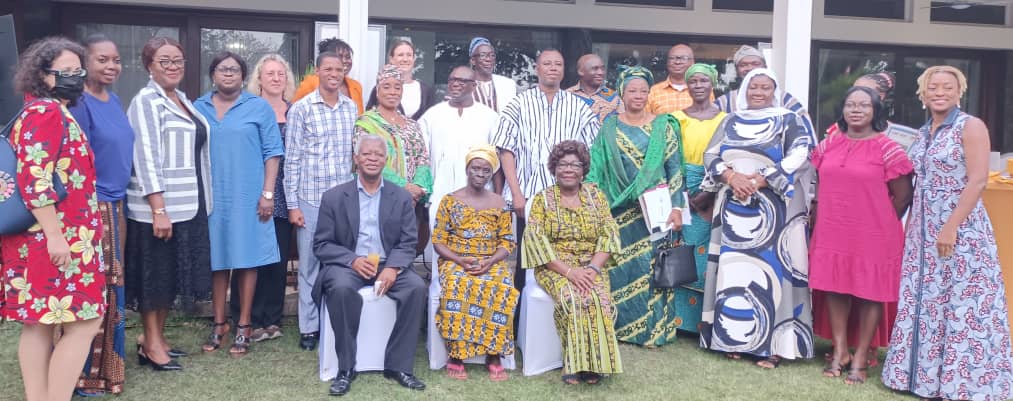By DisabilityNewsGH
At a roundtable meeting hosted by the British High Commission on Wednesday August 31, 2022, key stakeholders committed to collaborate to end witchcraft allegations, to address the deplorable conditions in the alleged witches camps and to safely re-integrate the alleged witches into their communities of choice.
A new evidence-based research report from Songtaba has identified a strong gender element to witchcraft allegations, with the vast majority (93.5%) of the accused being women, and most of the accused being older and widowed.
The research further found that over half of the women in the camps are experiencing depression and 97% have a low quality of life.
Representatives from the Alleged Witches Network spoke at the roundtable to explain how they have no food, no fuel, have challenges accessing safe drinking water, no funds to educate for their children or grandchildren, and very poor accommodations.
Many have experienced significant abuse following the witchcraft allegations against them. Nearly three-quarters of the women want to be re-integrated into their communities but are afraid of fresh allegations being made.
Speaking in response to the report, Deputy Minister for Gender, Children and Social Protection, who is also Minister Designate, the Hon. Lariba Zuweira Abudu, reiterated the Ministry’s continued commitment to end all forms of negative cultural practices and to protect marginalised people in society against human rights abuses, and to continue to enact measures to alleviate the deplorable conditions faced by the women in the camps.
The Executive Director of Songtaba, Lamnatu Adam said that “everyone here sees the issue of witchcraft allegations as a human rights violation. There is now that commitment from key stakeholders to do something about it”.
Joseph Whittal, Commissioner of the Commission of Human Rights and Administrative Justice (CHRAJ), shared key findings from a recent report on the alleged witches’ lack of access to justice and called on government to take on board the evidence presented and to move beyond reporting and rhetoric, towards action.
Dr Ama Boadu, Deputy Director for Mental Health, Ghana Health Service, and Prof Akwasi Osei, CEO of the Mental Health Authority, committed to support immediate efforts to address the mental health needs of the women in the camps.
Members of Parliament Hon. Samuel Ablakwa and Hon. Francis Sosu spoke passionately on the subject, with the former labelling the presence of the camps in Ghana as “a national disgrace”.
Hon. Sosu explained his motivation for working to present a Private Members Bill to criminalise witchcraft allegations, and invited interested parties to contribute to pre-consultations on the bill.
Civil society representatives from Action Aid, STARGhana Foundation, BasicNeeds-Ghana and Sanneh Institute further committed to support Songtaba in their efforts.
Lamnatu Adam summarised key next steps as needing to extend mental health and wellbeing support to the women now, as well as pushing for the closure of the camps and supporting women to safely reintegrate into their communities of choice as soon as possible. Supporting the Bill to criminalise witchcraft allegations can also go a long way to ending this practice.
Songtaba is a women and children rights Advocacy organisation committed to the realisation of the aspirations and rights of women and children. The organization was formed in 2005 and officially registered in April, 2006, and has since been working with organisations including NGOs, government agencies and community structures who share a vision of a violence-free and just society where women and children, especially girls as well as people with disability and exclusion, enjoy their fundamental rights.
Ghana Somubi Dwumadie (Ghana Participation Programme) is a four-year disability programme in Ghana, with a specific focus on mental health. This programme is funded with UK aid from the UK government. The programme is run by an Options-led consortium, which also consists of BasicNeeds-Ghana, Kings College London, Sightsavers International and Tropical Health, and focuses on four key areas:
Promoting stronger policies and systems that respect the rights of people with disabilities, including people with mental health disabilities..
Scaling up high quality and accessible mental health services.
Reducing stigma and discrimination against people with disabilities, including mental health disabilities..
Generating evidence to inform policy and practice on the effectiveness of disability and mental health programmes and interventions.
In December 2020, the programme launched its Main Grant Call under the theme ‘Evidence and
Effectiveness Grants for Mental Health and Disability Inclusion’. The overarching objective of the Call is to ensure that people with disabilities, including people with mental health disabilities, are in the lead on approaches to improve their wellbeing, social and economic outcomes, and rights. The Evidence and Effectiveness Grants were awarded by the programme to 9 grantees in April 2021, including to Songtaba.
SOURCE: DisabilityNewsGH.com

